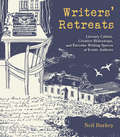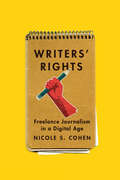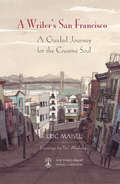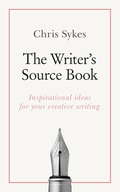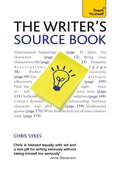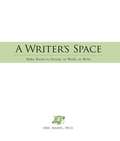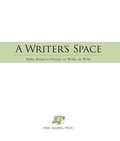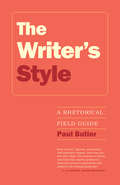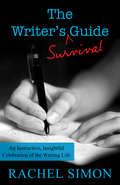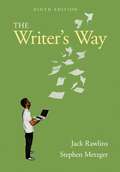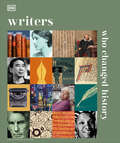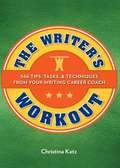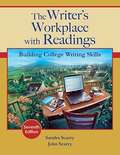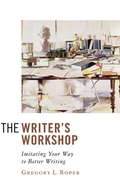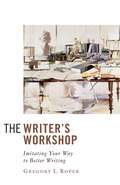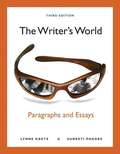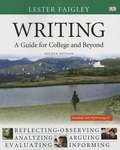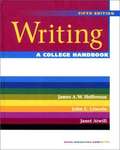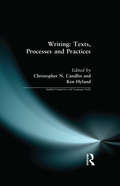- Table View
- List View
Writers' Retreats: Literary Cabins, Creative Hideaways, and Favorite Writing Spaces of Iconic Authors
by Neil BurkeyFeaturing over 50 writers and their getaways--get a glimpse into the creative habits of some of the greatest writers of the last two centuries. From Henry David Thoreau's famous cabin at Walden Pond and James Baldwin's 'Welcome Table' in Provence, to Roald Dahl's garden hut and Toni Morrison's sunrise-lit couch at dawn, Writers' Retreats reveals the quirky, private, and sometimes curious places where literary magic has happened. Each location is brought to life through illustration and the writer's own words on what made that place so perfect for creating.An exploration of famous literary writers of past and present, from Emily Dickinson and Marcel Proust to Margaret Atwood, Chimamanda Ngozi Adichie, and Alice Munro, this is the perfect bookish gift for both writers and booklovers to feed their fascination with what ignited the creativity behind their favorite works of literature.
Writers' Rights: Freelance Journalism in a Digital Age
by Nicole S. CohenAs media industries undergo rapid change, the conditions of media work are shifting just as quickly, with an explosion in the number of journalists working as freelancers. Although commentary frequently lauds freelancers as ideal workers for the information age - adaptable, multi-skilled, and entrepreneurial - Nicole Cohen argues that freelance media work is increasingly precarious, marked by declining incomes, loss of control over one's work, intense workloads, long hours, and limited access to labour and social protections. Writers' Rights provides context for freelancers' struggles and identifies the points of contention between journalists and big business. Through interviews and a survey of freelancers, Cohen highlights the paradoxes of freelancing, which can be simultaneously precarious and satisfying, risky and rewarding. She documents the transformation of freelancing from a way for journalists to resist salaried labour in pursuit of autonomy into a strategy for media firms to intensify exploitation of freelance writers' labour power, and presents case studies of freelancers' efforts to collectively transform their conditions. A groundbreaking and timely intervention into debates about the future of journalism, organizing precariously employed workers, and the transformation of media work in a digital age, Writers' Rights makes clear what is at stake for journalism's democratic role when the costs and risks of its production are offloaded onto individuals.
Writers' Rights: Freelance Journalism in a Digital Age
by Nicole S. CohenAs media industries undergo rapid change, the conditions of media work are shifting just as quickly, with an explosion in the number of journalists working as freelancers. Although commentary frequently lauds freelancers as ideal workers for the information age – adaptable, multi-skilled, and entrepreneurial – Nicole Cohen argues that freelance media work is increasingly precarious, marked by declining incomes, loss of control over one’s work, intense workloads, long hours, and limited access to labour and social protections. Writers’ Rights provides context for freelancers’ struggles and identifies the points of contention between journalists and big business. Through interviews and a survey of freelancers, Cohen highlights the paradoxes of freelancing, which can be simultaneously precarious and satisfying, risky and rewarding. She documents the transformation of freelancing from a way for journalists to resist salaried labour in pursuit of autonomy into a strategy for media firms to intensify exploitation of freelance writers’ labour power, and presents case studies of freelancers’ efforts to collectively transform their conditions. A groundbreaking and timely intervention into debates about the future of journalism, organizing precariously employed workers, and the transformation of media work in a digital age, Writers’ Rights makes clear what is at stake for journalism’s democratic role when the costs and risks of its production are offloaded onto individuals.
A Writer's San Francisco
by Paul Madonna Eric MaiselWhy does San Francisco hold such a special place in the history of American art and literature, and in the hearts of creative people everywhere? Come discover its allure with author Eric Maisel, America's foremost creativity coach. He reveals the city's writerly haunts, local oddities, and hidden treasures, as well as practical tips for writers in any locale. In thirty-two essays, each accompanied by a charming full-color drawing by Paul Madonna, A Writer's San Francisco takes an enchanted journey through one of the world's great cities and the creative process itself. Walk San Francisco's twisting streets, climb its famous hills, explore bohemian landmarks like City Lights Bookstore, and check out lesser-known neighborhoods like Bernal Heights. Along the way, Maisel conjures San Francisco writers past and present, including Twain, Ferlinghetti, and Kerouac, and tells personal stories from his three decades as a Bay Area writer, teacher, and creativity coach. Among the many lessons he offers are what it takes to persevere as a creative soul, how to be both parent and artist, and how to spend a perfect writing day in earthquake country. Paul Madonna's lavish drawings further illuminate the ambiance and romance of the City by the Bay. Whether you're a resident San Franciscan, a visitor, an armchair traveler, or an artistic soul seeking inspiration, in these pages you'll find practical lessons to inspire you. This is an intimate journey through the legendary city and through the mysterious terrain where art blooms.
The Writer's Source Book: Inspirational ideas for your creative writing
by Chris SykesLEARN NEW AND INSPIRING WAYS OF LIFTING YOUR CREATIVE WRITING.Is your creative writing in need of inspiration? Do you need confidence to create watertight plots and believable characters?The Writer's Source Book provides dozens of practical exercises to help you create storylines, craft people and generate ideas, with support and creative insight for every stage.It will give you support in identifying your genre and crafting your work around it, and help you to understand the complexities of plot and character before beginning to create your own.Inspired and inspiring exercises will help you master the structure of your book, story or play, while focused and innovative advise will help those who have run into trouble. This is a technical manual ideal for any writer who needs to build, fix, polish or perfect their storyline.ABOUT THE SERIESThe Teach Yourself Creative Writing series helps aspiring authors tell their story. Covering a range of genres from science fiction and romantic novels, to illustrated children's books and comedy, this series is packed with advice, exercises and tips for unlocking creativity and improving your writing. And because we know how daunting the blank page can be, we set up the Just Write online community at tyjustwrite, for budding authors and successful writers to connect and share.
The Writer's Source Book: Teach Yourself
by Chris SykesIs your creative writing in need of inspiration? Do you need confidence to create watertight plots and believable characters?The Writer's Source Book provides dozens of practical exercises to help you create storylines, craft people and generate ideas, with support and creative insight for every stage.It will give you support in identifying your genre and crafting your work around it, and help you to understand the complexities of plot and character before beginning to create your own.Inspired and inspiring exercises will help you master the structure of your book, story or play, while focused and innovative advise will help those who have run into trouble. This is a technical manual ideal for any writer who needs to build, fix, polish or perfect their storyline.
A Writer's Space
by Eric MaiselTo write what you want to write, the way you want to write it, you need to create both psychic and physical space. In A Writer's Space, noted creativity expert and bestselling author Dr. Eric Maisel shows you how to do just that. He takes you by the hand and guides you deep into your own creative process, helping you to: Honor your inner muse; Spark your creative impulse; Make the most of time you spend writing; Devise personalized rituals to start you writing and keep you writing; Create a work space that complements the writing process; Design a writing schedule that's easy to follow, no matter what. Calling upon his own writing experience, as well as his extensive knowledge of the creative process, Dr. Maisel will help you define the physical and mental space you need to produce the best work you've ever created, page after page!
A Writer's Space: Make room to dream, to work, to write
by Eric MaiselA Simon & Schuster eBook. Simon & Schuster has a great book for every reader.
A Writer's Space: Make Room to Dream, to Work, to Write
by Eric Maisel"Other books for writers will tell you where to insert the commas and why your Parisian character shouldn't wear a beret unless he's Basque. I want to chat with you about some other things: how to get into the right "space" to write, how to orient and organize your neurons, how to sanctify and enliven your physical space, and how to create imagined spaces in which magic can happen. In the thirty-six chapters that compose this book I'll use the metaphor of "space" to communicate how you can get a grip on your writing life and transform yourself from an occasional writer to a regular writer..." (excerpt from book, page 3)
A Writer's Space
by Eric MaiselA guide for writers to help them delve deep into their creative process.
The Writer's Style: A Rhetorical Field Guide
by Paul ButlerDesigned to help all writers learn to use style as a rhetorical tool, taking into account audience, purpose, context, and occasion, The Writer’s Style is not only a style guide for a new generation but a new generation of style guide. The book helps writers learn new strategies inductively, by looking at firsthand examples of how they operate rhetorically, as well as deductively, through careful explanations in the text. The work focuses on invention, allowing writers to develop their own style as they analyze writing from varied genres. In a departure from the deficiency model associated with other commonly used style guides, author Paul Butler encourages writers to see style as a malleable device to use for their own purposes rather than a domain of rules or privilege. He encourages writing instructors to present style as a practical, accessible, and rhetorical tool, working with models that connect to a broad range of writing situations—including traditional texts like essays, newspaper articles, and creative nonfiction as well as digital texts in the form of tweets, Facebook postings, texts, email, visual rhetoric, YouTube videos, and others. Though designed for use in first-year composition courses in which students are learning to write for various audiences, purposes, and contexts, The Writer’s Style is a richly layered work that will serve anyone considering how style applies to their professional, personal, creative, or academic writing.
The Writer's Survival Guide: An Instructive, Insightful Celebration of the Writing Life
by Rachel SimonThis inspirational guide for aspiring and experienced writers was originally published in 1997. Written in a friendly, hopeful, and gently humorous tone, it focuses on the creative process and emotional ups and downs of the creative life, providing insights into how to persist in the face of rejection, frustration, feelings of inadequacy, lack of support from loved ones, and more. It also offers practical how-to advice, from organizing your time so you actually sit down and write to reading as a writer. This ebook's rerelease of The Writer's Survival Guide includes a new introduction that discusses the origins of the book and how, in spite of the many changes in publishing and technology, it remains relevant today.
Writer's Toolbox: Letters, Fairy Tales, Scary Stories, Journals, Poems, Reports
by Nancy LoewenTurn readers into writers. Using a single or small number of genre-specific works, this new series explores the tools all beginning writers need. Each title includes a review list of key concepts, at least four exercises for getting started, and numerous writing tips.
The Writer's Way
by Jack Rawlins Stephen MetzgerThe spirit of THE WRITER'S WAY remains in the ninth edition, as do its two core principles: (1) good writing begins when writers know their audience and write for the right reasons; and (2) knowing their audience and having good reasons to write will teach users everything they need to know about technique. Based on a “whole language approach,” THE WRITER'S WAY is a dynamic, process-centered paperback rhetoric with readings. While this book is intended to be used in a classroom, it's very much based on the concept that there is little difference between writing in school and writing in the “real world.” Offering frank advice in a supportive, encouraging tone, the authors lead readers step by step through the writing process, from pre-writing to polishing the final draft.
Writers Who Changed History (DK History Changers)
by DKExplore the fascinating lives and loves of the greatest novelists, poets, and playwrights.Lavishly illustrated with photographs and paintings of writers’ homes, studies, and personal artifacts—along with pages from original manuscripts, first editions, and their correspondence—Writers Who Changed History introduces the key ideas, themes, and literary techniques of each writer, revealing the imaginations and personalities behind some of the world’s greatest novels, short stories, poems, and plays.Introduced with a stunning portrait of each featured novelist, playwright, or poet, biographical entries trace the friendships, loves, and rivalries that inspired each individual and influenced their work, revealing insights into the larger-than-life characters, plots, and evocative settings that they created. Each entry explains how the person’s writing developed during their lifetime and sets it in context, conveying a powerful sense of the place and the period of history in which they lived.Covering an eclectic range of authors from the Middle Ages to the present day, Writers Who Changed History provides a compelling glimpse of the lives and loves of each great writer.
The Writer's Workout
by Christina KatzThe inspiration, stamina, and power to take charge of your writing life--every day.Get the daily jolt of energy your writing life needs from The Writer's Workout. Inside you'll find manageable, no-nonsense techniques for every aspect of your writing career from getting organized to connecting with your audience to building relationships.Veteran writing coach Christina Katz draws on her knowledge from more than a decade in the business to give you tips, exercises, and insider strategies to build your skills.Make your writing as strong and powerful as possible.Pitch and sell your work at every opportunity.Overcome rejection to come back better than ever.Promote your work and build an audience.Learn how to balance your creative life with your daily life.With The Writer's Workout, you'll develop skill, strength, and confidence - everything you need to build a robust, unique writing career that's built to last.Bonus online exclusive: Download a free motivational poster to keep you moving as your build your writing career at writersdigest.com/writers-workout.
The Writer's Workout
by Christina KatzThe inspiration, stamina, and power to take charge of your writing life'every day. Get the daily jolt of energy your writing life needs fromThe Writer's Workout. Inside you'll find manageable, no-nonsense techniques for every aspect of your writing career from getting organized to connecting with your audience to building relationships. Veteran writing coach Christina Katz draws on her knowledge from more than a decade in the business to give you tips, exercises, and insider strategies to build your skills. Make your writing as strong and powerful as possible. Pitch and sell your work at every opportunity. Overcome rejection to come back better than ever. Promote your work and build an audience. Learn how to balance your creative life with your daily life. WithThe Writer's Workout, you'll develop skill, strength, and confidence ? everything you need to build a robust, unique writing career that's built to last. Bonus online exclusive: Download a free motivational poster to keep you moving as your build your writing career at writersdigest. com/writers-workout.
The Writer's Workplace with Readings: Building College Writing Skills (7th Edition)
by Sandra Scarry John ScarryFor more than 20 years, THE WRITER'S WORKPLACE has served the needs of more than half a million two- and four-year students as they have worked their way toward rewarding careers in a variety of fields. Sandra Scarry and John Scarry present writing instruction in a clear and inviting form, with step-by-step explanations to help build and maintain students' confidence in their writing. The result of many years of classroom teaching and research, this comprehensive and time-tested resource reflects the authors' understanding that students are unique individuals, with diverse backgrounds and interests that must be accounted for as they engage in the writing process.
The Writer's Workshop: Imitating Your Way to Better Writing
by Gregory L. RoperThe Writer’s Workshop takes an approach to teaching writing that is new only because it is so old. Today, rhetoric and composition typically proceed by ignoring what was done for 2,500 years in Western education. Gregory Roper, on the other hand, helps students learn to write in the way the great writers of the past themselves learned: by carefully imitating masters of the craft, including Cicero, Thomas Aquinas, Charles Dickens, Sojourner Truth, James Joyce, and Ernest Hemingway. By living in their workshops and apprenticing to these and other masters, apprentice writers—like apprentice musicians, painters, and blacksmiths of the past—will rapidly improve the complexity of their art and discover their own native voices.Interspersed into chapters full of sound practical advice and challenging assignments are reflections on Great Ideas from “Realism and Impressionism” to “Nominalism and Modern Science.” Perfect for the college or even high school writing classroom—as well as a marvelous book for homeschoolers and others who would like to improve their own writing—The Writer’s Workshop is a fine practical guide, and Dr. Roper a friendly yet demanding teacher-mentor.
The Writer's Workshop: Imitating Your Way to Better Writing
by Gregory L. RoperThe Writer's Workshop takes an approach to teaching writing that is new only because it is so old. Today, rhetoric and composition typically proceed by ignoring what was done for 2,500 years in Western education. Gregory Roper, on the other hand, helps students learn to write in the way the great writers of the past themselves learned: by carefully imitating masters of the craft, including Cicero, Thomas Aquinas, Charles Dickens, Sojourner Truth, James Joyce, and Ernest Hemingway. By living in their workshops and apprenticing to these and other masters, apprentice writers—like apprentice musicians, painters, and blacksmiths of the past—will rapidly improve the complexity of their art and discover their own native voices. Interspersed into chapters full of sound practical advice and challenging assignments are reflections on Great Ideas from "Realism and Impressionism" to "Nominalism and Modern Science." Perfect for the college or even high school writing classroom—as well as a marvelous book for homeschoolers and others who would like to improve their own writing—The Writer's Workshop is a fine practical guide, and Dr. Roper a friendly yet demanding teacher-mentor.
The Writer's World: Paragraphs and Essays (3rd Edition)
by Lynne Gaetz Suneeti PhadkeThe Writer's World series was written to address the diverse needs of today's students: students whose first language is not English, students who respond favorably to visuals, and students who have varying skill levels.
Writing: A Guide for College and Beyond, Fourth Edition
by Lester FaigleyFor college courses in Composition and Rhetoric. Revealing the writing process through interactive learning Writing: A Guide for College and Beyond presents writing, reading, and research processes dynamically, using a variety of visuals to illustrate how readers interact with texts and how writers compose. One of the first textbook authors to focus on multimedia composing, Lester Faigley employs his own advice to engage students in every step of the writing process-for both college composition and everyday life-and pulls back the curtain on how writers work. Aligned with the learning goals for a first-year college writing course identified in the 2014 Outcomes Statement from the Council of Writing Program Administrators, Writing: A Guide for College and Beyond gives students the support they need to succeed in first-year composition, in their other courses, and in their careers. In the Fourth Edition, students can also practice and explore what they've learned chapter-by-chapter with interactive MyWritingLab tools, assignments and projects. Also available with MyWritingLab(tm) This text is also available with MyWritingLab(tm) - an online homework, tutorial, and assessment program designed to work with this text to engage students and improve results. Within its structured environment, students practice what they learn, test their understanding, and pursue a personalized study plan that helps them better absorb course material and understand difficult concepts.
Writing: A College Handbook (5th edition)
by James A. W. Hefferman John E. Lincoln Janet AtwillThe Fifth Edition exemplifies in clear, engaging prose the skills that students need to communicate in a wide variety of rhetorical contexts. A reliable and easy-to-use reference tool and an up-to-date rhetoric and research guide, Writing: A College Handbook invites students to discover the power of effective writing.
Writing: Texts, Processes and Practices (Applied Linguistics and Language Study)
by Ken Hyland Christopher N. CandlinWriting: Texts, Processes and Practices offers an innovative and multidisciplinary approach to writing in a variety of academic and professional settings. The book is composed of a series of original research-based accounts by leading authorities from a range of disciplines. The papers are linked through a unifying perspective which emphasises the role of cultural and institutional practices in the construction and interpretation of written texts.This important new book integrates different approaches to text analysis, different perspectives on writing processes, and the different methodologies used to research written texts. Throughout,an explicit link is made between research and practice illustrated with reference to a number of case studies drawn from professional and classroom contexts.The book will be of considerable interest to those concerned with professional or academic writing and will be of particular value to students and lecturers in applied linguistics, communication studies, discourse analysis, and professional communications training.The contributors to this volume are: Robert J. BarrettVijay K. BhatiaChristopher N. CandlinYu-Ying ChangSandra GollinKen HylandRoz IvanicMary R. LeaIan G. MalcolmJohn MiltonGreg MyersGuenter A. PlumBrian StreetJohn M. SwalesSue WeldonPatricia Wright
